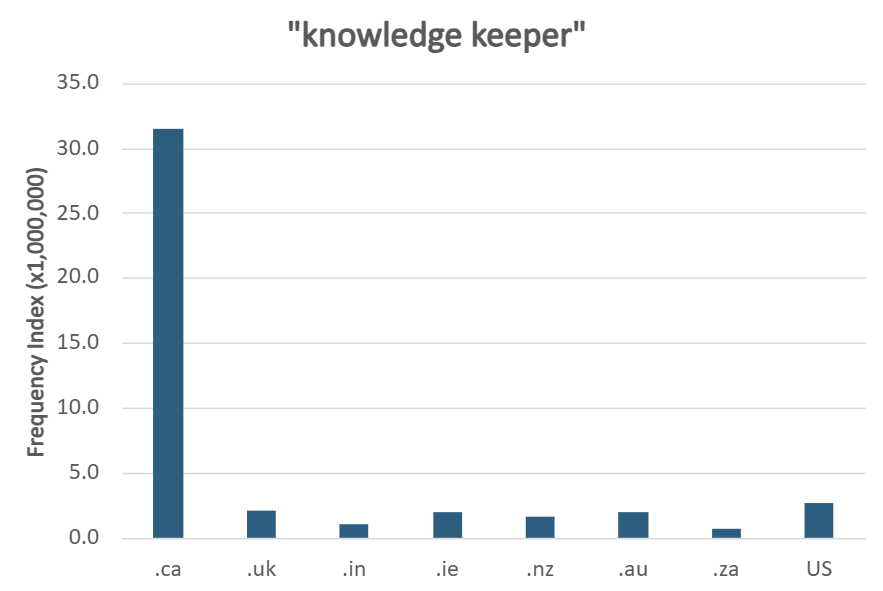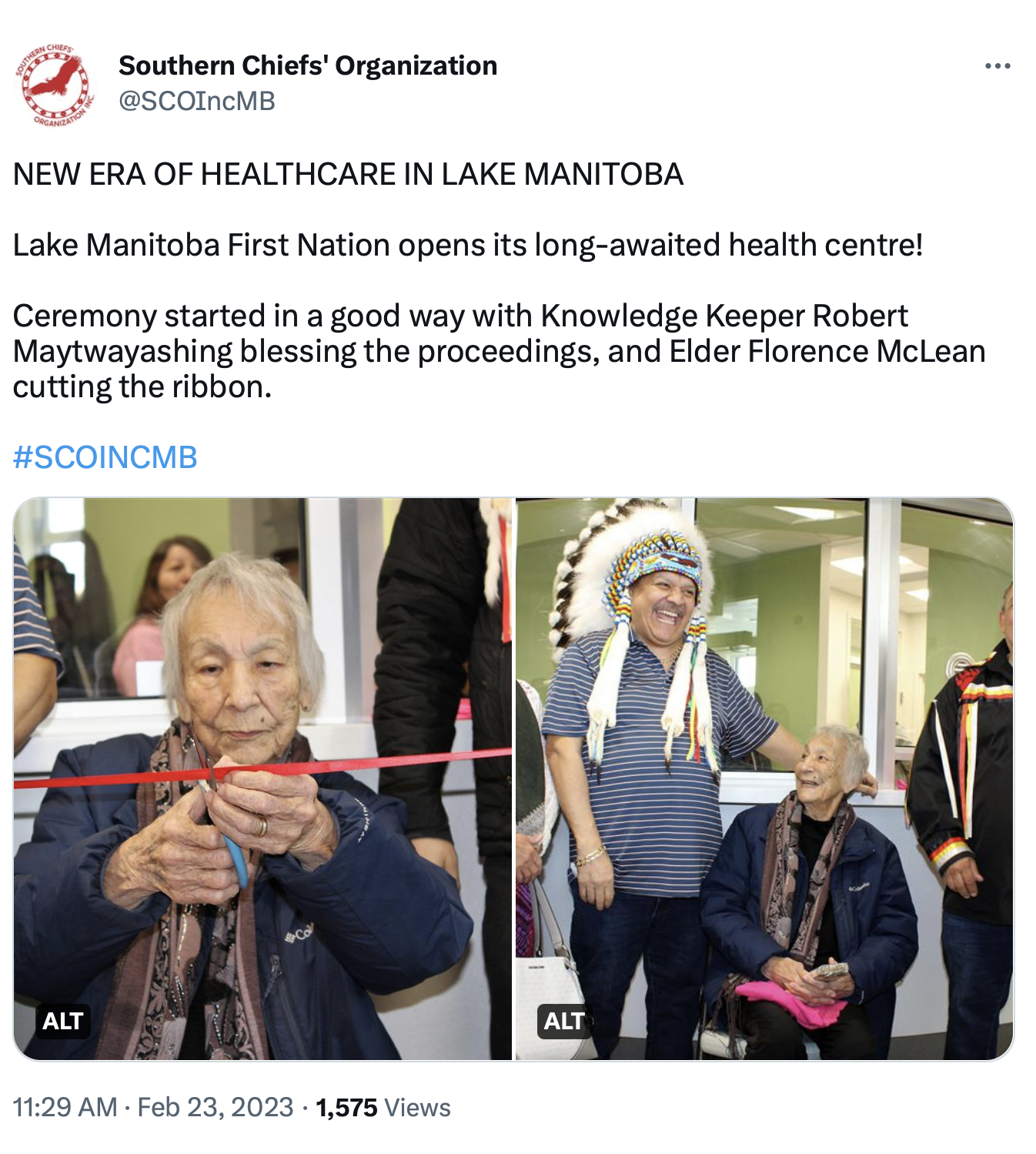Quick links
knowledge keeper
DCHP-3 (Apr 2025)
Spelling variants:Knowledge Keeper
n. — Indigenous, especially Education
an Indigenous person whose role is to maintain cultural knowledge.
Type: 4. Culturally Significant — The origins of the term knowledge keeper are outside of Canada. An early published attestation is from an Australian business news publication (see the 1999 quotation) that draws on the second part of its definition ("whose role is to maintain cultural knowledge").
Knowledge keeper in its full and complete meaning appeared in several former British colonies during the early 2000s, in particular in Malaysia (see the second 2000 quotation), the US (see the first and third 2000 quotations, and the 2001 quotation), Canada (see the 2014 quotation), New Zealand and Australia - all countries with significant Indigenous populations suffering the devastations of colonization.
Subsequently, the use of knowledge keeper in Canada began to outstrip its frequency in the other former colonial countries (see Chart 1). Around 2015, as a result of Calls to Action published by the Truth and Reconciliation Commission of Canada, the term knowledge keeper became firmly established in Canada. Article 76.ii specifically advocates for an increased reliance upon Knowledge Keepers (see 2015 quotation and the TRC reference). Since then, the use of knowledge keeper and its variants has been widespread in mainstream Canadian publications (see the 2018, 2022 and 2023 quotations), and especially prominent in education circles (see the 2017 quotation).
See Image 1 for another example of contemporary use.
Knowledge keeper in its full and complete meaning appeared in several former British colonies during the early 2000s, in particular in Malaysia (see the second 2000 quotation), the US (see the first and third 2000 quotations, and the 2001 quotation), Canada (see the 2014 quotation), New Zealand and Australia - all countries with significant Indigenous populations suffering the devastations of colonization.
Subsequently, the use of knowledge keeper in Canada began to outstrip its frequency in the other former colonial countries (see Chart 1). Around 2015, as a result of Calls to Action published by the Truth and Reconciliation Commission of Canada, the term knowledge keeper became firmly established in Canada. Article 76.ii specifically advocates for an increased reliance upon Knowledge Keepers (see 2015 quotation and the TRC reference). Since then, the use of knowledge keeper and its variants has been widespread in mainstream Canadian publications (see the 2018, 2022 and 2023 quotations), and especially prominent in education circles (see the 2017 quotation).
See Image 1 for another example of contemporary use.
Quotations
1999
[Revitalising your company by charging a knowledge keeper to provide inspirational leadership will not only lead to increased productivity, but to workers having a greater appreciation of the contribution they make to the workplace.Can you afford NOT to have a knowledge keeper?]
2000
[On that same day in Old Fort, N.C., Chief Two Trees, chief knowledge keeper for the Bear Clan of the Cherokee Nation, had passed on the clan pipes signifying his position as tribal healer to his daughter, Darlene Wind Trees.]
2000
[The Tales From Oban The Knowledge Keeper, mainly of Australian origin, are often entertaining and lively, and some nice illustrations enhance enjoyment.]
2000
[Oban's title, the Knowledge Keeper, could mean that he is a very wise man and remembers all of his people's legends and myths. He likes to share these tales with others so that we can all learn to live in harmony with one another.]
2001
[Martin explained that in Mentasta Lake, everyone does what John asks. In addition to being a chief, John is the community's knowledge keeper, something that she was trained for as a child, said James Kari, a former UAF linguist who transcribed and edited a book about the Athabascan people who live at the headwaters of the Copper River.]
2014
Ron Indian-Mandamin journeyed from the shores of Shoal Lake First Nation to offer a water blessing on Sunday. Mr. Indian-Mandamin, a 35-year-old self-described faith and knowledge keeper, said the blessing is meant to keep volunteers away from harm as they conduct the search.
2015
76. ii. Information shall be sought from residential school
Survivors and other Knowledge Keepers in the
development of such strategies.
2017
Bentley Cheechoo, a Knowledge Keeper and retired Chief, speaks of his childhood treaty education from Elders and how he continues to educate Indigenous and non-Indigenous children about treaties. This video is for secondary students and older students.
2018
Position Description:
The Traditional Knowledge keeper position is key component to the delivery of the wholistic programming
within Gwekwaadziwin. This position will support Land Based Treatment, Live in Aftercare, and Community
Aftercare; by offering Anishinabek teachings and guidance. This position will have a flexible schedule in order
to meet program and participant needs.
2022
Theresa Sims is a renowned traditional knowledge keeper and Elder from the upper Mohawk, Turtle Clan of the Six Nations Reserve. She promises to offer a rich and abundant collection of stories of the elements, land, water, and the animals, teaching and entertaining along the way. We are looking forward to these opportunities to grow in our understanding of and appreciation for the Mi'kmaq and Mohawk traditions.
References
- TRC
Images

Chart 1: Internet Domain Search, 16 March 2023
